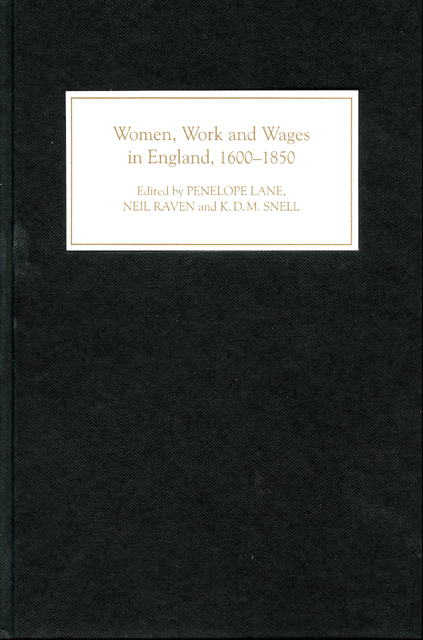Book contents
- Frontmatter
- Contents
- Illustrations
- Notes on Contributors
- Acknowledgements
- Introduction
- 1 ‘Waste’ Children? Pauper Apprenticeship Under the Elizabethan Poor Laws, c. 1598–1697
- 2 Gender at Sea: Women and the East India Company in Seventeenth-Century London
- 3 Sickles and Scythes Revisited: Harvest Work, Wages and Symbolic Meanings
- 4 A Customary or Market Wage? Women and Work in the East Midlands, c. 1700–1840
- 5 ‘Meer Pennies for My Baskitt Will be Enough’: Women, Work and Welfare, 1770–1830
- 6 Caring for the Sick Poor: Poor Law Nurses in Bedfordshire, c. 1770–1834
- 7 ‘A ‘Humbler, Industrious Class of Female’: Women’s Employment and Industry in the Small Towns of Southern England, c. 1790–1840
- 8 A Diminishing Force? Reassessing the Employment of Female Day Labourers in English Agriculture, c. 1790–1850
- Bibliography
- Index
4 - A Customary or Market Wage? Women and Work in the East Midlands, c. 1700–1840
Published online by Cambridge University Press: 21 March 2023
- Frontmatter
- Contents
- Illustrations
- Notes on Contributors
- Acknowledgements
- Introduction
- 1 ‘Waste’ Children? Pauper Apprenticeship Under the Elizabethan Poor Laws, c. 1598–1697
- 2 Gender at Sea: Women and the East India Company in Seventeenth-Century London
- 3 Sickles and Scythes Revisited: Harvest Work, Wages and Symbolic Meanings
- 4 A Customary or Market Wage? Women and Work in the East Midlands, c. 1700–1840
- 5 ‘Meer Pennies for My Baskitt Will be Enough’: Women, Work and Welfare, 1770–1830
- 6 Caring for the Sick Poor: Poor Law Nurses in Bedfordshire, c. 1770–1834
- 7 ‘A ‘Humbler, Industrious Class of Female’: Women’s Employment and Industry in the Small Towns of Southern England, c. 1790–1840
- 8 A Diminishing Force? Reassessing the Employment of Female Day Labourers in English Agriculture, c. 1790–1850
- Bibliography
- Index
Summary
Women’s historians of the medieval through to the modern period have observed the sizeable difference between the money wages received by women and men, which could range from as little as one-third to one-half. This discrepancy, some of them have concluded, indicates that women’s wages were the product of custom and not equality in the labour market. Furthermore, some historians see such disparity as arising from women’s position in the family, which places them as dependent rather than as fully independent economic agents. The role of custom in determining wage levels is difficult to ascertain with any precision, given that it is not always clear what other factors may have contributed at different times and locations. Woodward has described custom as ‘that great stand-by of the social historian and frequently invoked explanation for all that is difficult to understand’. However, his comments with regard to women’s wages still stress the role of custom. ‘The low rates of pay given to most women in the early modern period were rooted in convictions – underscored by biblical authority – about their physical, economic and social, intellectual and political inferiority… which has characterised English society into the present century.’ Sharpe, in her study of working women in the south of England, concluded that for the eighteenth and early nineteenth centuries women’s wages contained both a customary and a market element.
In a challenging article, Joyce Burnette took this issue a step further, and contended that for the period of the Industrial Revolution women were in general paid market wages. Moreover, she argued that the notion of a customary wage has arisen due to errors in measurement and differences in the productivity levels of men and women. If wage discrimination did exist, it occurred in areas of the labour market that were the least competitive. One of the problems that women’s historians have in determining trends over time in wage rates, or the differences in wage levels that existed between men and women, is the absence of data beyond a handful of examples. Indeed, as Burnette pointed out, a number of major studies have drawn upon a thin body of evidence with which to support the view of widespread wage discrimination.
- Type
- Chapter
- Information
- Women, Work and Wages in England, 1600-1850 , pp. 102 - 118Publisher: Boydell & BrewerPrint publication year: 2004
- 1
- Cited by



